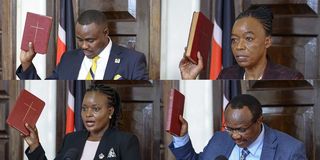'Strangers' in Ruto cabinet and the war Uhuru lost

Sworn to secrecy: President William Ruto cleared UDA secretary general Cleophas Malala (top left) and advisers David Ndii (bottom right), Monica Juma (top right) and Harriette Chiggai to attend Cabinet meetings.
President William Ruto's decision to allow three of his advisers and United Democratic Alliance (UDA) Secretary General Cleophas Malala to attend Cabinet meetings has raised questions about whether he has overstepped his constitutional mandate.
On Wednesday, Mr Malala and presidential advisers David Ndii (Economy), Monica Juma (National Security) and Harriet Chiggai (Women's Affairs) took the oath of secrecy to attend Cabinet meetings.
According to a State House release, the four have been cleared to attend Cabinet meetings from now on. This is despite the High Court nullifying a similar move by President Ruto's predecessor, Uhuru Kenyatta, in 2021.
President Kenyatta had co-opted the then Director General of Nairobi Metropolitan Services, Lieutenant General Mohamed Badi, into Cabinet.
When he appointed 22 people to his Cabinet, President Ruto also named Ms Juma and Ms Chiggai as his advisers, saying their positions were ministerial. However, lawyers say the Constitution sets out the process of appointing Cabinet members and their number. Article 152 of the Constitution of Kenya 2010 states that the number of Cabinet Secretaries shall not be less than 14 nor more than 22 and that the President shall nominate and appoint them with the approval of the National Assembly.
"Any action that violates the constitution and the constitutional process raises questions," says lawyer Tom Maosa. He says President Ruto's move is a breach of the Constitution even though the advisers can be invited to advise the Cabinet on matters within their respective roles.
Political analyst Dr Isaac Gichuki says the President is taking shortcuts to increase the number of Cabinet ministers. But he says the swearing in of the four does not make them cabinet secretaries because due process was not followed.
A statement from State House said President Ruto allowed Ms Chiggai to attend Cabinet meetings in line with his agenda to put women's issues at the centre of his Kenya Kwanza administration.
However, the statement did not explain why Mr Malala, Dr Ndii and Ms Juma were allowed to attend the Cabinet meeting.
In the case of Mr Malala - the secretary general of the ruling party - President Kenyatta had co-opted Raphael Tuju, the secretary general of the Jubilee Party, as a cabinet secretary without portfolio.
However, Mr Tuju was counted as one of the CSs to fill the maximum 22 slots allowed by the constitution.
State House did not say this week whether Mr Malala would enjoy such a privilege, but even then the cabinet is already full at 22.
Lawyer Ahmednassir Abdullahi questioned whether the president had been properly briefed on a Supreme Court ruling that banned 'strangers' from attending cabinet meetings.
The ruling barred Lieutenant General Mohamed Badi from attending cabinet meetings after President Uhuru Kenyatta issued a presidential order allowing him to do so.
"Has the Honourable Attorney General Justin Muturi or CS Alice Wahome informed President William Ruto of this High Court ruling that prevents strangers from eavesdropping on Cabinet meetings?" asked Mr Abdullahi in a Twitter post on Monday.
Ms Wahome, the Water CS in Kenya's Kwanza administration, was an ally of President Ruto (who was Deputy President) when she filed the petition challenging President Kenyatta's decision, claiming that allowing Mr Badi to attend Cabinet meetings was against the Constitution.
The ruling barred Lieutenant General Mohamed Badi from attending Cabinet meetings after President Uhuru Kenyatta issued a presidential order allowing him to do so.
"Has the Honourable Attorney General Justin Muturi or CS Alice Wahome informed President William Ruto of this High Court ruling that prevents strangers from listening in on Cabinet meetings?" asked Mr Abdullahi in a Twitter post on Monday.
Ms Wahome, the Water CS in Kenya's Kwanza administration, was an ally of President Ruto (who was Deputy President) when she filed the petition challenging President Kenyatta's decision, claiming that allowing Mr Badi to attend Cabinet meetings was against the Constitution.
In his ruling, Justice Mrima agreed with Ms Wahome that President Kenyatta's decision was not approved by the National Assembly and was therefore unconstitutional.
Attorney General Justin Muturi was the Speaker of the National Assembly when the ruling was made in September 2021. Judge Mrima issued an order preventing Major General Badi from attending cabinet meetings, cabinet committees or performing any ministerial functions. In his case, Ms Wahome claimed that President Kenyatta's decision was akin to allowing a stranger to attend a meeting of the country's highest decision-making body and that the President had therefore violated the Constitution.
In his ruling, Justice Mrima said the position, responsibility and authority of the Director of NMS in the Cabinet was not known or the respondents (Attorney General, Cabinet Secretary and Major General Badi) chose not to disclose.
"It appears that the decision is shrouded in secrecy and therefore lacks transparency," the judge said in his ruling. Since he had not been vetted by the National Assembly, Judge Mrima said the decision to allow the NMS director-general into the cabinet raised many questions that could not be answered.





